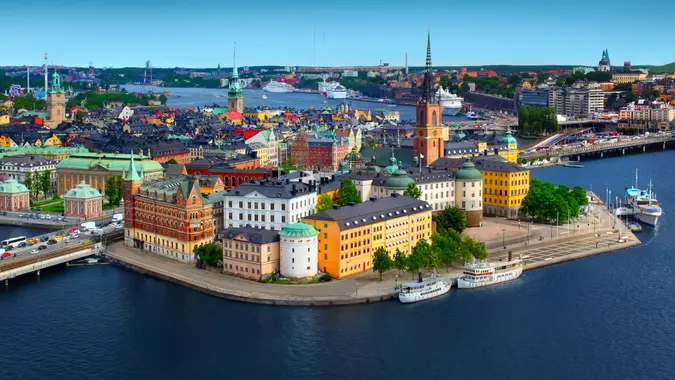5 European Housing Markets That Will Plummet in Value by the End of 2025

Commitment to Our Readers
GOBankingRates' editorial team is committed to bringing you unbiased reviews and information. We use data-driven methodologies to evaluate financial products and services - our reviews and ratings are not influenced by advertisers. You can read more about our editorial guidelines and our products and services review methodology.

20 Years
Helping You Live Richer

Reviewed
by Experts

Trusted by
Millions of Readers
There’s no telling what the future holds for the European real estate market.
In some places, particularly those with limited supply and high demand, housing prices could skyrocket in the coming months or years. In markets where demand is low and available supply is high, the cost of residential real estate could plummet.
Although there are no guarantees either way, GOBankingRates reached out to several real estate experts to get their predictions on which European housing markets will plummet in value by the end of next year. Here’s what they said.
Spain
Like many other parts of the world, Spain’s housing market was hit hard during the financial crisis of 2007, causing a housing bubble burst. Prices plummeted from around 2,874 euros per square meter (on average) to 2,002 euros per square meter.
Since that time, however, prices have once again been on the rise and now average out at 2,809 euros per square meter, slightly below what it was in 2007.
However, it’s possible that Spain’s housing market will once again see a steep decline in the coming months or years.
“Continuing fallout from Brexit as well as active resistance to tourism, especially in hotspots like Barcelona and Mallorca, mean that many vacation rentals could soon be on the market as permanent residences,” said Martin Orefice, the CEO of Rent To Own Labs.
“These are likely to command much lower prices, since there’s less revenue to be had from this model.”
Netherlands
The Netherlands is another market that could plummet in value before the end of 2025. Brady Bridges, a broker and the owner of Reside Real Estate, said that there’s already been a downturn in the Dutch housing market — specifically down 4.49% at the end of 2022.
Bridges noted that there could be several reasons for this, not least of which are high interest rates (which remain a prevalent problem throughout many parts of the world) and limited housing supply.
According to Statista, the average price of a residential home in the Netherlands is 434,000 euros. Certain areas, like Utrecht, are currently priced higher at an average of 546,000 euros. Others, like Groningen, have an average price of 319,000 euros.
Greece
Citing data from the Bank of Greece, Global Property Guide found that the cost of residential property in Greece skyrocketed at the start of 2024, rising by 10.76% from the year prior. Home prices rose by about 2.4% in Q1 2024, but they are still lower than they are in many other European countries.
Despite strong signs of growth this year, some experts predict a dip in the next year or so.
“Greece is still recovering from its debt crisis, and prices remain over 40% below their pre-crisis peak,” said Ashley Gawley, a seasoned real estate professional and an expert in European real estate markets.
There’s also the possibility that demand could fall in the coming year, further contributing to lower housing prices in the country.
Italy
Gawley also predicted that Italy’s housing market could plummet. “In Italy, home prices have dropped over 10% in the last 5 years,” she said.
The country also faces certain political and economic headwinds — like high interest rates — that could lead to a further fall in prices. Like anywhere else, it does depend on the region.
Some cities in Italy, like Milan, are still in high demand. Regarding the Italian luxury real estate market in particular, JamesEdition released a report showing that the average listing price of luxury homes is 915,800 euros (with a range from 696,832 to 1,294,117 euros, depending on location).
Sweden
Some parts of Sweden, particularly cities like Stockholm where prices have already started to cool, are showing signs of a future housing market decline.
“Sweden… has had a long period of rising home values,” said Michael Kotler, the founder of Move Ahead Homes, “but with interest rates jumping up and mortgage costs becoming more burdensome, I think we’re starting to see some cooling in their market.”
Global Property Guide‘s most recent market report revealed that Sweden’s housing market has seen a significant downturn in recent times.
“During 2023, the national house price index fell by 6.31%, worse than the prior year’s decline of 3.73% and in stark contrast to [year-over-year] increase of 15.78% in 2021,” the report read. “Last year was the country’s worst showing since 1993.”
According to Kotler, property prices in urban areas — like Stockholm — could decline further in the face of economic uncertainty and decreased buyer demand.
 Written by
Written by  Edited by
Edited by 

























